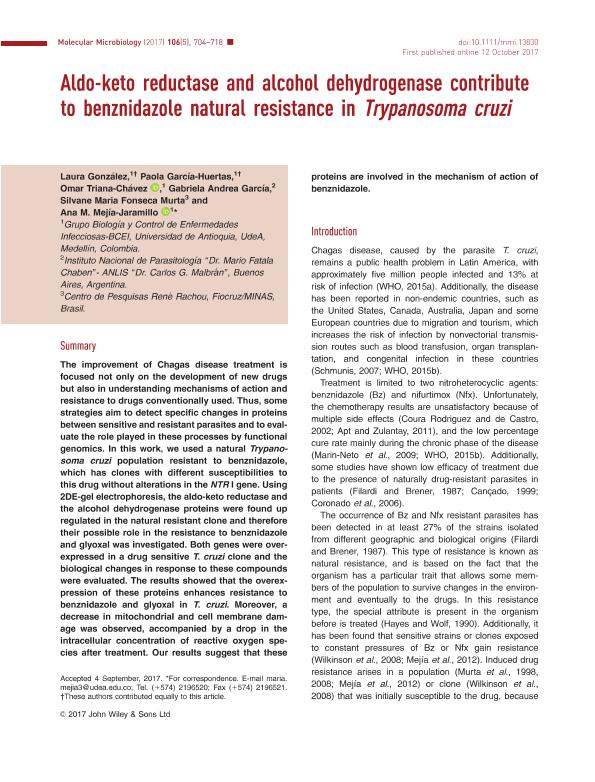Artículo
Aldo-keto reductase and alcohol dehydrogenase contribute to benznidazole natural resistance in Trypanosoma cruzi
González, Laura; García Huertas, Paola; Triana Chávez, Omar; Garcia, Gabriela Andrea ; Murta, Silvane Maria Fonseca; Mejía Jaramillo, Ana M.
; Murta, Silvane Maria Fonseca; Mejía Jaramillo, Ana M.
 ; Murta, Silvane Maria Fonseca; Mejía Jaramillo, Ana M.
; Murta, Silvane Maria Fonseca; Mejía Jaramillo, Ana M.
Fecha de publicación:
12/2017
Editorial:
Wiley Blackwell Publishing, Inc
Revista:
Molecular Microbiology
ISSN:
0950-382X
Idioma:
Inglés
Tipo de recurso:
Artículo publicado
Clasificación temática:
Resumen
The improvement of Chagas disease treatment is focused not only on the development of new drugs but also in understanding mechanisms of action and resistance to drugs conventionally used. Thus, some strategies aim to detect specific changes in proteins between sensitive and resistant parasites and to evaluate the role played in these processes by functional genomics. In this work, we used a natural Trypanosoma cruzi population resistant to benznidazole, which has clones with different susceptibilities to this drug without alterations in the NTR I gene. Using 2DE-gel electrophoresis, the aldo-keto reductase and the alcohol dehydrogenase proteins were found up regulated in the natural resistant clone and therefore their possible role in the resistance to benznidazole and glyoxal was investigated. Both genes were overexpressed in a drug sensitive T. cruzi clone and the biological changes in response to these compounds were evaluated. The results showed that the overexpression of these proteins enhances resistance to benznidazole and glyoxal in T. cruzi. Moreover, a decrease in mitochondrial and cell membrane damage was observed, accompanied by a drop in the intracellular concentration of reactive oxygen species after treatment. Our results suggest that these proteins are involved in the mechanism of action of benznidazole.
Palabras clave:
Chagas Disease
,
Chemotherapy
,
Drug
Archivos asociados
Licencia
Identificadores
Colecciones
Articulos(SEDE CENTRAL)
Articulos de SEDE CENTRAL
Articulos de SEDE CENTRAL
Citación
González, Laura; García Huertas, Paola; Triana Chávez, Omar; Garcia, Gabriela Andrea; Murta, Silvane Maria Fonseca; et al.; Aldo-keto reductase and alcohol dehydrogenase contribute to benznidazole natural resistance in Trypanosoma cruzi; Wiley Blackwell Publishing, Inc; Molecular Microbiology; 106; 5; 12-2017; 704-718
Compartir
Altmétricas



